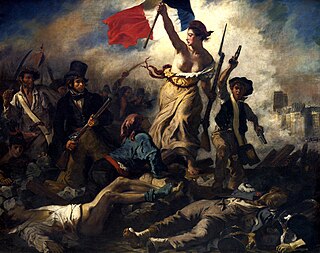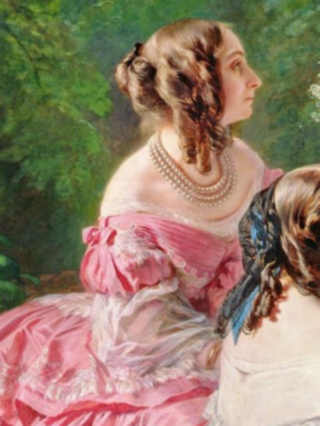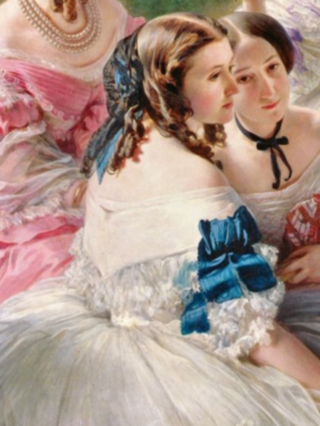
Napoleon III was the first president of France from 1848 to 1852, and the last monarch of France as Emperor of the French from 1852 until he was deposed in absentia on 4 September 1870.

Napoléon, Prince Imperial, also known as Louis-Napoléon, was the only child of Napoleon III, Emperor of the French, and Empress Eugénie. After his father was dethroned in 1870, he moved to England with his family. On his father's death in January 1873, he was proclaimed by the Bonapartist faction as Napoleon IV.

DoñaMaría Eugenia Ignacia Agustina de Palafox y Kirkpatrick, 19th Countess of Teba, 16th Marquise of Ardales, known as Eugénie de Montijo, was Empress of the French from her marriage to Napoleon III on 30 January 1853 until the Emperor was overthrown on 4 September 1870. From 28 July to 4 September 1870, she was the de facto head of state of France.
Pierre Marie Augustin Filon (1841–1916) was a French professor of rhetoric and the author of a number of works of fiction, as well many articles, reviews and books on contemporary English politics, art and literature.

The Second French Empire was an Imperial Bonapartist regime of Napoleon III from 14 January 1852 to 27 October 1870, between the Second and the Third French Republics. The period was one of significant achievements in infrastructure and economy, while France reasserted itself as the dominant power in Europe.

Beginning in May 1968, a period of civil unrest occurred throughout France, lasting seven weeks and punctuated by demonstrations, general strikes, and the occupation of universities and factories. At the height of events, which have since become known as May 68, the economy of France came to a halt. The protests reached a point that made political leaders fear civil war or revolution; the national government briefly ceased to function after President Charles de Gaulle secretly fled France to West Germany on the 29th. The protests are sometimes linked to similar movements around the same time worldwide that inspired a generation of protest art in the form of songs, imaginative graffiti, posters, and slogans.

The French Revolution of 1830, also known as the July Revolution, Second French Revolution, or Trois Glorieuses, was a second French Revolution after the first in 1789. It led to the overthrow of King Charles X, the French Bourbon monarch, and the ascent of his cousin Louis Philippe, Duke of Orléans. After 18 precarious years on the throne, Louis-Philippe was overthrown in the French Revolution of 1848.

The Tuileries Palace was a royal and imperial palace in Paris which stood on the right bank of the Seine, directly in front of the Louvre. It was the Parisian residence of most French monarchs, from Henry IV to Napoleon III, until it was burned by the Paris Commune in 1871.

Wolf-Heinrich Julius Otto Bernhard Fritz Hermann Ferdinand Graf von Helldorff was an SA-Obergruppenführer, German police official and politician. He served as a member of the Landtag of Prussia during the Weimar Republic, as a member of the Reichstag for the Nazi Party from 1933, and as Ordnungspolizei Police President in Potsdam and in Berlin. From 1938 he became involved with the anti-Nazi resistance, and was executed in 1944 for his role in the 20th July plot to overthrow Adolf Hitler's regime.

A series of anti-government riots took place in Armenia following presidential elections held on 19 February 2008. Protests broke out in the Armenian capital Yerevan, organized by supporters of presidential candidate and former president Levon Ter-Petrosyan and other opposition leaders.

Princess Marie Amelie of Baden was the youngest daughter of Charles, Grand Duke of Baden and Stéphanie de Beauharnais. In 1843, she married the Scottish nobleman William Hamilton, Marquess of Douglas and Clydesdale. They became the Duke and Duchess of Hamilton upon the death of William's father in 1852. Their only daughter Mary married the future Albert I, Prince of Monaco and was the mother of Louis II.

The French Revolution of 1848, also known as the February Revolution, was a period of civil unrest in France, in February 1848, that led to the collapse of the July Monarchy and the foundation of the French Second Republic. It sparked the wave of revolutions of 1848.

Charles Émile Waldteufel was a French pianist, conductor and composer known for his numerous popular salon pieces.

Pauline Marie Ghislaine de Bassano, née van der Linden d'Hooghvorst, was a French courtier. She served as dame d'honneur to Empress Eugénie de Montijo in 1853–1867.

Paris during the reign of King Louis-Philippe (1830-1848) was the city described in the novels of Honoré de Balzac and Victor Hugo. Its population increased from 785,000 in 1831 to 1,053,000 in 1848, as the city grew to the north and west, while the poorest neighborhoods in the center became even more crowded.

The Place Jean-Jaurès, a.k.a. La Plaine, is a historic square in Marseille, Bouches-du-Rhône, Provence-Alpes-Côte d'Azur, France. As early as the 13th century, it was a camping ground for Christian Crusaders on their way to the Holy Land. It later became a meeting place to welcome dignitaries and members of the French royal family. It is now home to a farmers' market. It is named after politician Jean Jaurès.

Anne Debelle, Princesse d'Essling, was a French courtier. She served as Grand-Maitresse to Empress Eugénie de Montijo in 1853–1870.

Émile Joseph Marie Piétri, known as Joachim Pietri, was a French lawyer and public servant who was prefect of several departments, a repressive police chief of Paris in the last years of the Second French Empire and Bonapartist Senator of Corsica from 1879 to 1885.

Jane Mary Thorne, baronne de Pierres was a French courtier of American origin. She served as lady-in-waiting to the empress of France, Eugénie de Montijo.
The 1990–1992 movement in Madagascar was a strike movement and popular uprising that rocked Madagascar demanding free results of elections, new constitution and shared their dissatisfaction with the government in Madagascar which led to elections and the fall of the government in 1990–1992.





















